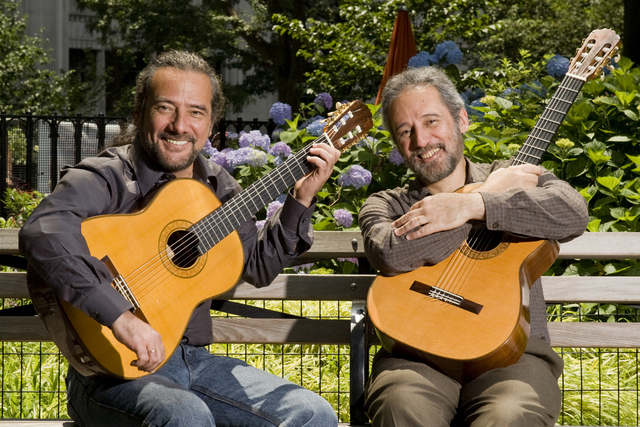Assad Brothers share spotlight with fellow Brazilian
Brothers Odair and Sergio Assad have been making music together for more than 50 years. The brilliant guitarists, born in Brazil, have earned worldwide recognition as arguably the most polished yet most flexible guitar duo.
Yet Friday’s program was performed not by a duo but by a guitar trio. The Assads were joined by another brilliant Brazilian guitarist, Romero Lubambo. Lubambo’s celebrity is based primarily on his success combining the worlds of Brazilian music and jazz. We didn’t expect to see a full evening’s collaboration with him and the Assads, but that’s what we got, and it was, well, interesting.
In fact, the brothers seemed more than willing to turn the spotlight on Lubambo at virtually every opportunity: a gracious gesture, but somewhat disappointing to audience members who came to see the featured artists.
An early attention-getter was an intricate combination of a Chopin prelude and Antonio Carlos Jobim’s “Insensatez.” The work imaginatively displayed “… two sides of the music,” according to Sergio Assad. It was sensitively and faultlessly played by the three artists. Throughout the evening, communication between the brothers was apparent by their frequent exchange of expressive glances, most of which signified approval.
The brothers’ discography is heavily weighted to Brazilian composers and artists with a smattering of internationally recognized names such as violinist Nadja Solerno-Sonnenberg and the late Astor Piazzola. Lubambo’s extensive recording credits reflect a virtual who’s who of prominent jazz artists with whom he has collaborated. The list of American artists alone contains such names as Herbie Mann, Diana Krall and Jane Monheit as well as such classical artists as guitarist Sharon Isbin and cellist YoYo Ma.
There was no printed program, and fewer than half the evening’s selections were even announced. The few that were came through in Portuguese (some in Spanish), which did not afford much help to our resident audience.
But translation or no, the music’s spirit came through. The Assad Brothers, usually known for performing from memory, used scores for the most part, as did Lubambo. That could point to a new recording project in the offing (just a guess). The merger of Brazilian music and jazz is not a stretch, but there were a few moments of incompatibility. Some of Lubambo’s improvising produced licks more suited to Ray Charles than to South America, but that may simply be a manifestation of my North American ear.
A show business device called “saving the best for last” paid off well. The evening’s final selection, a samba, brought the crowd to its feet. The featured trio was well balanced – not a consistent factor earlier – and hit a rhythmic groove that had most of the near-capacity audience at least foot-tapping, if not wanting to get up and dance.
Postconcert lobby talk had several audience members expressing the wish that at least a few selections had highlighted the Assad Brothers as a duo. I agree. As good a performer as Lubambo is, he is not well known to Las Vegas audiences. The brothers are, and their earlier appearance here appears to be what generated the near-capacity crowd in Cabaret Jazz.
REVIEW
Who: Assad Brothers with Romero Lubambo
When: 7:30 p.m. June 19 and 20
Where: Cabaret Jazz at The Smith Center
Grade: B+
Tickets: www.thesmithcenter.com




























